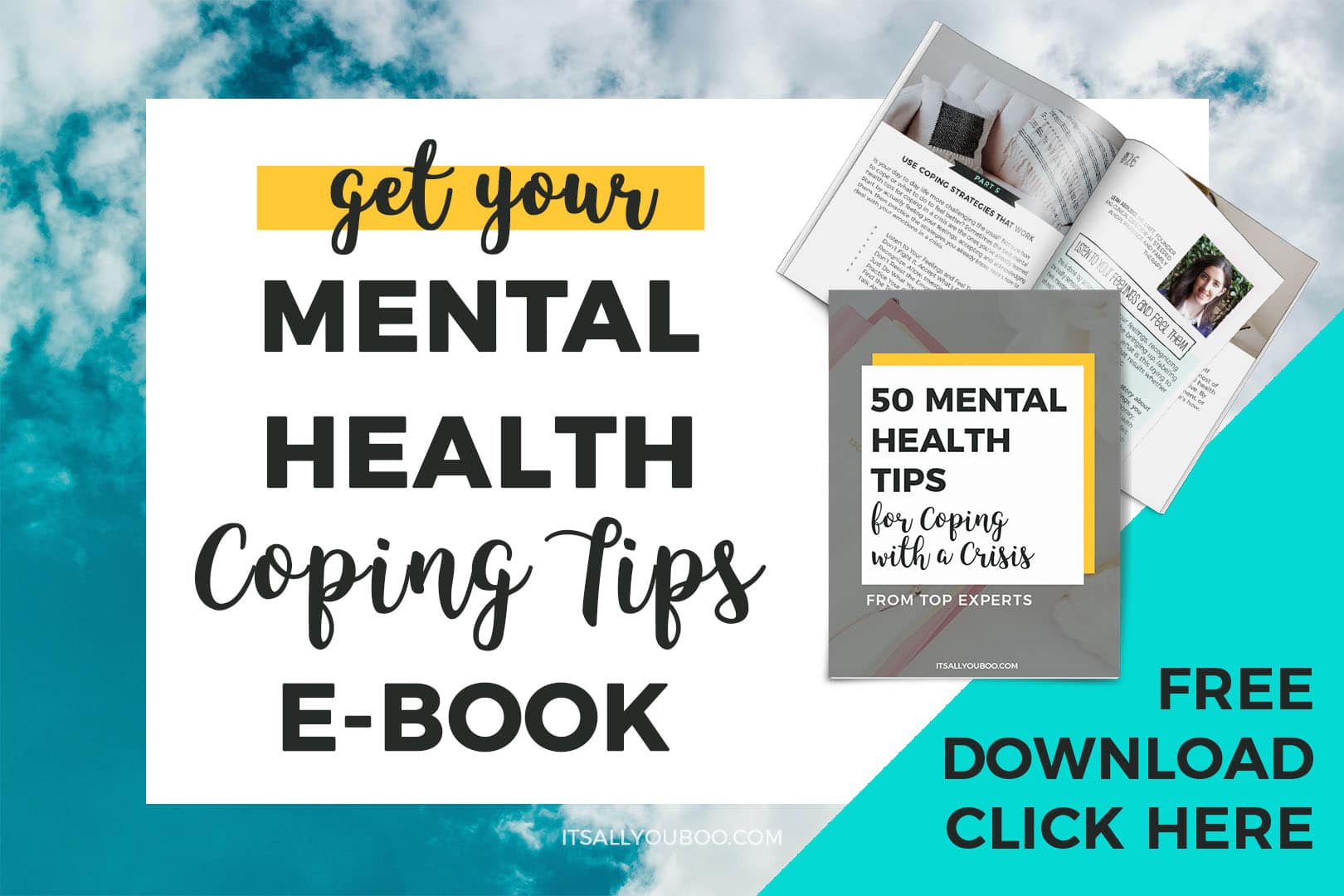Has the global pandemic impacted your mental health and wellness?
Stress levels are higher than ever, anxiety and fear are through the roof. The current crisis has most of us on the edge more than ever before.
And it’s not just the fears surrounding our physical health, but also the mounting economic and financial concerns during the crisis. Some of us have lost their jobs, now working at home with kids, or even trying to secure unemployment benefits.
With all this uncertainty and seemingly unending escalations, it’s no wonder our mental health is under threat. One thing is clear, mental health is more important than ever.
Table of Contents:
Mental Health Tips for Coping in a Crisis:
Even though it might feel impossible to escape them, now is not the time to ignore your emotions and feelings. But rather to ease them, to care for yourself and the mental health of your and your family.
To make time to mental health and emotional wellness activities and exercises that keep you calm, at peace, and well balanced, even as the world seems chaotic.
Please, if you are facing mental health challenges and need support, please seek out professional help. Assistance is just a phone call away, with trained professionals and counselors even offering sessions online. All you have to do is search for “help phone” or a “therapist near me” in Google.
To help you focus on your mental health, I reach out to 50 mental health and emotional wellness experts, including doctors, psychologists, therapists, and counselors asking, “What’s your #1 mental health tip for coping with a crisis?”
Plus, be sure to click here to get your FREE Mental Health Tips for Coping eBook with all 50 strategies for you keep.
![]()
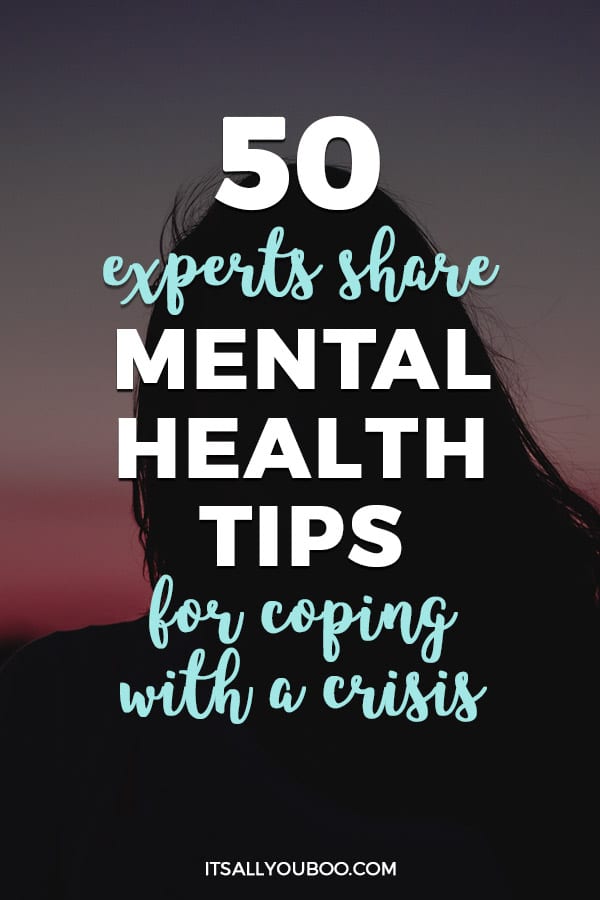
![]() THIS POST MAY CONTAIN AFFILIATE LINKS.
THIS POST MAY CONTAIN AFFILIATE LINKS.![]()
IF YOU MAKE A PURCHASE FROM THESE LINKS, I MAY EARN A SMALL COMMISSION.
CLICK HERE FOR MY FULL DISCLAIMER STATEMENT.
Set a Schedule for Your Days
Do you feel lost and unsure about what to do each day? Do you find yourself wasting hours and feeling unsure about what to even do? With more of us sheltering in place, staying home every day, and even working at home with kids, our typical everyday routine has gone out the window. One of the best mental health tips for coping with a crisis is to create a new schedule or set a new normal. Within this routine, you can cope better in a crisis and take control of the feelings of uncertainty. Here’s how:
- Keep A Weekday Routine Going
- Stick to Your List of Daily Tasks
- Maintain a Consistent Schedule
- No Drastic Changes to Your Day
- Make a List of Things to Do Every Day
- Create a New Normal For Yourself
- Focus on What You Can Control
#1. Keep A Weekday Routine Going

Aniesa Blore
Paediatric Occupational Therapist
I have been encouraging all my clients to keep a routine going. Set your weekday alarm to go off as usual. Get up, do your usual morning routine, and start your day. Have a different alarm and ritual for weekends.
If you normally go to the gym in the morning, then ‘go to the gym’ in your lounge or kitchen – watch a youtube video or whatever suits you and do your exercise. Get dressed for work – do your make-up, do your hair. If your kids are homeschooling – pack them their usual snack. If they wear a uniform, get them to put it on.
It will make going back to school and work so much easier. Keep all your usual mental health strategies going – if you practice mindfulness or gratitude twice a day, then do not stop. Keeping everything as close to ‘normal’ as possible.
Have your set coffee breaks and lunch breaks. If you would normally walk to Starbucks at 10:15 – then walk around your house or in your garden if you have one, and then make a coffee. Take it to your desk. Finish work when you would normally finish work – don’t drag it out. Routine routine routine.
👉🏽 Aniesa is a leading Paediatric Occupational Therapist, founder of Sensational Kids Therapy in London. She currently provides occupational therapy to children who have a range of emotional, physical, learning, sensory, and social difficulties. Aniesa is passionate about raising understanding and awareness for their families, as well as teaching staff, focusing on their own emotional well-being in the process.
#2. Stick to Your List of Daily Tasks

Yocheved Golani
Editor and Writer, e-counseling
Mental health tips for coping in a crisis come down to one piece of good sense that pays many dividends: Stick with a routine. Managing each day with specific actions, expectations, and a sense of accomplishment leaves a person feeling refreshed, responsible, and mature. Make your bed each day, put on fresh clothes, prepare sensible meals, tidy up your home – and your home office if you have one, focus on your employment tasks or new employment search, and take time to just breathe.
Do some aerobic or other workouts to keep your body strong. Exercise creates several chemicals that leave us feeling happy and thinking more clearly than before we used our muscles. Behaving in these ways is the essence of adult behavior.
With too much downtime, normal people can feel an endless list of negative emotions and thoughts. Staying busy and focused minimizes the problem. It can even prevent bad moods from starting, or from starting over. Make A list of daily tasks and stick to them. Focus on your future with an “I am functional” daily routine, not on mind-numbing news reports and fattening behaviors. You’ll be coping with the crisis instead of letting it flatten you.
👉🏽 Yocheved Golani is author and journalist plus a life coach certified in Health Information Management and counseling skills. Her specialty is End of Life Issues/Spiritual Chaplaincy. She is also an editor and writer at e-counseling.com.
#3. Maintain a Consistent Schedule

Danielle
Food and Wellness Blogger
Routine, routine, routine. Keeping some sort of routine helps create a sense of normalcy and calm. Even if that routine is getting up and doing my daily face routine or keeping dinner at the same time, despite our work schedule being upended, I feel better knowing these are things I have to do. Maintaining a consistent schedule of little things that you know you have to do during the day at a particular time can help you keep putting one foot in front of the other and keep moving forward.
👉🏽 Danielle is a food and wellness blogger, creating simple recipes that anyone can make. Lots of health and wellness tips sprinkled in, to help achieve an overall healthy balanced life. Recipes have been featured in FoodGawker.
#4. No Drastic Changes to Your Day

Carmen
Vicariously Through You
Maintain as close to the same routine you had before being quarantined as you can. I get up at the same time each morning. I put on makeup and make my bed. I make plans with friends via Zoom or FaceTime in the evening instead of meeting them out for dinner or drinks. Not drastically changing things reminds me that I can successfully navigate this strange but hopefully temporary time.
Looking into the future makes me anxious so it’s important that I focus only on now, today, and tomorrow, not next week or next month. And when I do have a bad day or get overwhelmed, I call someone and talk through it. We’re all going through this and most people are willing to help if needed. You just need to reach out and ask for it.
👉🏽 Carmen is the creator of Vicariously Through you, a travel and lifestyle blog for women in their 30’s and 40’s. She has traveled at all 50 US states and over 25 countries, often solo. A few of her favorite things include Cubs baseball, tulips, and trying new restaurants. She currently lives in Chicago with her feisty pup, Stella.
#5. Make a List of Things to Do Every Day

Jessica Jefferson
Marriage and Family Therapist
When we are stuck at home and Netflix is right there calling for us, it is easy to get stuck doing not much of anything during the day. While Tiger King is very amusing, it isn’t going to do much for you at the end of the day.
What could help to keep yourself and your mental health on track is to keep some structure or schedule to your day. So make a list of things that you need to get done every day, like brushing your teeth or showering (which for a lot of people goes out the window), things that would be nice to get done and tasks that could help you relax. Try to accomplish at least two of the items on each of those lists. Anything that wasn’t completed could be added on to the next day. Having a good mix of productivity and relaxation can reduce the guilt of sitting on the couch for longer than you wanted.
Having a structure or schedule will also help you adjust easier to “normalcy” once the quarantine is over, so it doesn’t all hit you like a ton of bricks.
👉🏽 Jessica Jefferson is a registered marriage and family therapist intern specializing in working with young adults suffering from anxiety, depression, and life transitions. Through therapeutic conversations, she works to help individuals finally feel confident, happy, and relax no matter what life throws at them. To learn more, check out her website at Cloud Nine Therapy.
#6. Create a New Normal For Yourself

Jasmine C. Williams
Motivational Speaker
A lot of people are understandably overwhelmed right now because our world feels chaotic. Things are constantly changing and it’s drastically impacting our daily lives. One reason for this is the impact sudden change has on our routines. I’ve lived through my share of chaos over the years and it’s had a major impact on my mental health. That’s why I’ve become an expert on How to Stop Half-Assin’ It when you’re faced with adversity.
The most important thing we need to do right now is to find that sense of ‘normal’ in our worlds again. Think about the part of your normal daily routine that you miss the most (the gym, podcasts on your commute, pedicures with your friend) and identify the deeper meaning of why it is so important to you. What does it represent? Maybe you miss the place that empowers you, your stress outlet, or the people who make you laugh.
Now you have to fill that void. You have to find a new way to create the same feeling that part of your routine did. We can’t just wait around for things to go back to normal; we have to create a new normal for ourselves.
👉🏽 Jasmine C. Williams is a motivational speaker who teaches audiences How to Stop Half-Assin’ It. Jasmine inspires college students, millennials, entrepreneurs, and women across the country on important issues, such as overcoming adversity, mental health, and grief. You can connect with Jasmine on her website, JasmineCWilliams.com, or on social media @JwillayyJob.
#7. Focus on What You Can Control

Dr. Holland-Kornegay
Wellness In Real Life
Look after yourself. Focus on things you can control (like having good hygiene) instead of those you cannot (stopping the virus). Where possible, maintain your daily routine and normal activities like eating healthy meals, getting enough sleep, and doing things that you enjoy.
Consider creating a daily routine that prioritizes your wellbeing and positive mental health. Activities, like taking a walk, meditating, or exercising, can help you to relax and will have a positive impact on your thoughts and feelings.
👉🏽 Dr. Tasha Holland-Kornegay is passionate about others reach their maximum potential. She is an author, motivational speaker, and entrepreneur. She created Wellness In Real Life to help decrease health care provider burnout.
Live a Healthy, Balanced and Active Life
Are you eating your feelings right now? Do you find that you’re unmotivated to exercise or even shower? You’re not alone! This global pandemic has most of us stuck at home with nowhere to go. No wonder we’re not interested in looking our best or even taking care of ourselves. That’s the impact of the crisis on our mental health. That’s why some of the best mental health tips for coping in a crisis including living a healthy and active life. Here are some ideas:
- Maintain a Healthy Lifestyle
- Focus on Life Balance
- Move to a New Room
- Go for Walk and Get Fresh Air
- Choose a “Healthy” Outfit
- Make Sure You’re Not Overindulging
- Create Good Sleeping Habits
#8. Maintain a Healthy Lifestyle

Wysa
Mental Health App
The lack of a fixed routine can contribute to feelings of listlessness and a lack of purpose. You may feel aimless and unsure of what you can do for the better half of the day. To tackle this, try to follow some sort of structure even during the quarantine period.
Wake up at a certain time and get ready for work before you attend to work calls. Try to finish off the daily professional commitments by a certain time every day. This will bring back a semblance of normalcy in your daily routine and help you cope through these tough times. Sleep deprivation afflicts a large part of the population. Many of us sideline sleep in the pursuit of academic or professional success.
While the quarantine period may or may not have reduced your workload, it has definitely cut down on the travel time completely. Use these extra hours to nourish your mental health by getting a good night’s sleep and allowing your body to heal from the years of neglect. Use the isolation period to nap your way to better health! Plan your meal so that your body gets enough nutrition every day. Having a strong immune system is very important; so spend time cooking your favorite meal with enough nutrients.
Also, keep yourself hydrated by drinking enough water. Finally, dedicate a minimum of 20 minutes for meditation or relaxation in your daily schedule. You can choose to do any form of exercise from yoga or meditation.
👉🏽 Therapist at Wysa. The best Digital mental Health App by ORCHA.
#9. Focus on Life Balance

Catharina Kallio, MA
Senior Consultant
Definitely focusing on life balance.
Living a balanced life means we live our lives with inner peace and harmony, something that can also be described as happiness. Life balance can be described as having to do with your personal setting of needs. Some of them are biological or physical and some are more of the mental or emotional sort. Life balance could include variations including: spending time in nature, downtime, relationships, food, sleep, exercise, passion, focusing on mindset.
👉🏽 Catharina Kallio, MA (Finland), works as a Senior Consultant in the field of HR. She helps customers recruit employees and makes personality assessments. Catharina is a Certified Business Coach (ICF accr.) and a Career Coach. She also trains leaders in how to develop and become better at understanding their employees. Connect with her at Working My Mind.
#10. Move to a New Room

Stephanie Woodrow, LCPC, NCC
It’s important for people to keep their brains and bodies moving, even when indoors. Spend a maximum of 30 minutes in one room, doing one activity, and then move to a new room and activity. This could mean deep cleaning the microwave followed by organizing pictures in the bedroom and moving into the living room to watch TV before heading outside for a walk. This teaches the brain and body that there are new stimuli and environments, keeping us on alert and prevents stagnation, which can contribute to depression.
👉🏽 Stephanie Woodrow, LCPC, NCC has a private practice in the Washington, D.C. area specializing in the treatment of adults with anxiety disorders, obsessive-compulsive disorder, and related disorders. Last year Stephanie was named an Emerging Leader by the Anxiety and Depression Association of America.
#11. Go for Walk and Get Fresh Air

Dr. Brian Wind Ph.D.
Clinical Psychologist
The current pandemic has easily exacerbated symptoms of depression in those who have it, as well as created situational depression for those suffering from the effects of this crisis. Depression, regardless of how it develops, can be immobilizing and change one’s everyday life for the worse if ignored. Thankfully, symptoms of depression can be minimized and managed at home with the right coping mechanisms.
At a time where we cannot do much of anything, getting out and taking a walk can be a saving grace. Not only does walking expose you to some Vitamin D am fresh air, but it also gets your blood pumping. As you walk, your brain starts to release endorphins that improve your mood and aid in your general contentment, thus giving you some relief in this time of crisis.
While most Americans do not have a steady, structured daily schedule at this time, ensuring you make time to take at least one walk each day can help ease the load of depression and the symptoms that are being triggered by the pandemic. As long as you are following your state’s rules and taking the necessary precautions, you can take walks wherever permitted. Changing your scenery can be just as vital as the act of walking, as it can help refresh, restore, and relax you.
👉🏽 Dr. Brian Wind Ph.D. is a recognized leader in clinical psychology with over 15 years of experience. He’s co-chair of the American Psychological Association, adjunct professor at Vanderbilt University, and a clinical executive at JourneyPure – a healthcare company with 20+ locations across the country.
#12. Choose a “Healthy” Outfit

Vanessa Valiente
Fashion Blogger, V-STyle
We all instinctively know clothing can alter our mood, but there is actually a scientific term for the power of clothing: enclothed cognition. In contrast to embodied cognition effects which are fairly direct, researchers Hajo Adam and Adam Galinsky think enclothed cognition effects will depend on two conditions – first, the symbolic meaning of the clothing and second, the actual wearing of the clothes.
In relation to the current crisis, getting dressed for the kind of day you want to have is vital for your health. If you want to feel in control, wear your most empowering outfits. If you want to feel calm, wear your resort wear. If you want to feel happier, wear your most colorful and joyous garments. Choosing a “healthy” outfit each morning is one thing we all have control over.
👉🏽 Vanessa Valiente is San Diego’s #1 Image Consultant, and first fashion blogger, V-Style, EST. 2007. She has been featured in the Washington Post and National Geographic to name a few publications.
#13. Make Sure You’re Not Overindulging

Amanda Webster
Mind Body Wellness Coach
Right now we are stuck at home and many of us are under immense stress and pressure to readjust our lives to meet the demands of confinement life while still ensuring that our bills are paid and our kids are educated. Not surprisingly, alcohol sales are up 55%.
While having a glass of wine or a beer after a long day can be relaxing, make sure that you are not drinking as a means to cope with stress. Remember, alcohol is a depressant and it can affect your sleep quality, both of which will only make this unique situation harder to deal with.
Before pouring a glass or popping a tab, make sure that you are drinking because you want to, not because you feel like you need to. Check-in with yourself and make sure that you aren’t trying to mask a feeling or avoid facing a challenge. Also, it is best to stick to a 12 ounce can or glass and avoid hard alcohol and mixed drinks.
👉🏽 Amanda Webster is a certified Mind Body Wellness coach, who has featured in Women’s Health and Cosmopolitan. She has a personal history with overcoming the grief, depression, and anxiety that came with being diagnosed as having a Serious Mental Illness (SMI.)
#14. Create Good Sleeping Habits

Mason Culligan
Mattress Battle
Watch your sleeping habit during the outbreak. It is inevitable for stress, depression, and insomnia to arise during this global pandemic. One way you can reduce your chance of falling into these mental issues is by watching your sleeping habit.
Being sleep-deprived means your brain is not well-equipped with sufficient energy to process thoughts and emotions. Sleep is crucial, especially in this time of crisis where anxiety level is high. Your mental state can be affected particularly during this isolation due to lockdown and quarantine.
With all these disruptions in our daily lives and numbers of cases and deaths rising exponentially, it is critical to have a sound mind and a healthy body. A good sleeping habit, of about seven to eight hours, is essential as it produces infection-fighting antibodies which can help avoid aggravating your mental health conditions. Note that excessive sleeping is also unideal as it can affect your wellbeing.
Sleep is a habit that you should maintain. Establish a regular sleeping schedule and be consistent with it. Familiarizing yourself with the same sleeping patterns every day helps you achieve long-term quality sleep.
👉🏽 Mason Culligan runs a multimedia company called Mattress Battle which is a company he created two years ago.
Take Care of Yourself with Self-Care
Are you stressed, overwhelmed, or burnout right now? What about struggling to focus or be productive? This is normal right now. We’re all on edge, emotions running high and feeling drained. During times of crisis, you need to take time for self-care. Whatever that means to you personally, doing it daily is one of the best mental health tips. Here are some ways to take care of yourself during the pandemic:
- Do What Feels Good to Your Soul
- A Little Self Care and Relaxation
- Just Be Kind to Yourself
- Apply A Self-Care Strategy
- Fill Up Your Souls, Not Your Belly
- Practice Acceptance as Self-Care
#15. Do What Feels Good to Your Soul

Steph Palermo
Intuitive Coach and Healer
I find that clients in crisis are all consumed. Their minds are clogged. Activities like meditation are difficult. During stressful times: grief, break ups, anxiety, the person can only see the storm. Their head hangs low, not wanting to look at their reality. It is not only one day at a time, it could be one hour at a time, or even fifteen minutes at a time, in the worst cases.
I advise: Do the next right thing that feels good in your soul. Engage in any activity that gives you a little reprieve at that moment: take a nap; talk about it; cry; watch TV; distract. Keep trying to feel as good as you can by doing the next right thing for you, one step at a time. Continue putting one foot in front of the other, doing the next right thing. Soon, you will lift your gaze and the scenery will have changed.
👉🏽 Steph Palermo, Just Steph, is an intuitive coach and healer, author, international speaker, and talk show host. Steph offers 1:1 coaching, workshops, and retreats to help people heal and level up their lives, align, and live a life of greater purpose that is fun, satisfying, and successful. Steph’s latest book, “It’s Not Personal Sonny. It’s Business:” How to run your family, life and business like a Sicilian, is currently available to pre-order.
#16. A Little Self-Care and Relaxation

Makaela Premont
Uniquely Mickie
My number one tip to coping in a crisis to indulge in a little self-care and to relax during this time! Our everyday lives are always go-go-go and it’s always about the hustle, but sometimes it’s nice to just sit back and do something that brings you joy. Whether that be running a hot bath, or applying a face mask or reading a new book, do something that you don’t normally have time for and enjoy the peace that comes with it.
👉🏽 Makaela Premont is a current fourth-year pharmacy student at the University of South Carolina. Makaela created her blog, Uniquely Mickie, where she shares her experiences in pharmacy school as well as give advice to help other millennials navigate the real world. Her blog provides advice and tips on college life, fashion, and pharmacy school. Makaela shares 7 Simple Tips to Boost Your Self-Confidence.
#17. Just Be Kind to Yourself

Michelle
Bliss From Balance
The most important thing to remember is to be kind to yourself. This is an unprecedented time and we shouldn’t set expectations on strict dieting, gaining weight, working out consistently, etc.
There are so many events going on in the world, resulting in so many different and often negative emotions, that being hard on yourself is the last thing you should do. Make an effort every day to focus on self-care.
If you need a moment, excuse yourself from conversations. Take a day totally dedicated to your well being, and find what makes you happy. Remove stress factors in your life – if you were weighing yourself every day and it is now causing unneeded stress, reduce the number of weigh-ins or don’t look at all.
As things progress in the world we will eventually be back to the closest “normal” we can get. At that point, we can do a self-check-in and see what our priorities are. For now though, please take it easy on yourself, as we are often our own biggest critic.
👉🏽 Michelle is a resident of New York City where she lives with her husband and dog. Her weekday 9 to 5 is focused on marketing. All other hours she is looking for ways to build balance in her life and to help others find their balance. She values fitness, good food (mostly healthy but not always), and travel as great ways to stay healthy and happy. She shares 10 Ideas for Finding Balance in an Anxious World.
#18. Apply A Self-Care Strategy

Kelsey
Strong Calm Kelsey
My anxiety is a high energy, so in stressful times I can tend to “go go go” until I eventually crash. To prevent this, I’ve been taking time to intentionally “check-in” with myself daily.
At the end of my workday, I ask myself what I am feeling, what I want, and what I need. And then I apply a self-care strategy based on those insights for comfort, connection, recharging, motivation, release, or distraction.
This prevents me from trying to do too much and allows me to be intentional with how I spend my time. I have a free printable on this method as well on my blog!
👉🏽 Kelsey is a millennial, a wife and dog-mom, a new homeowner, a health enthusiast, and an aspiring self-help author. In her 30-ish (*wink*) years on this planet, she’s learned a lot. On her blog, Strong Calm Kelsey, she writes about her journey to becoming her best self in the hopes of helping other women become stronger, calmer, and more confident in their authentic selves.
#19. Fill Up Your Souls, Not Your Belly
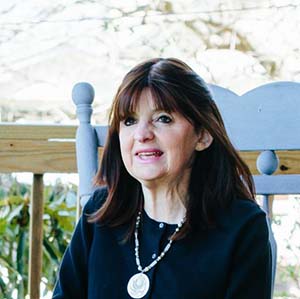
Bracha Goetz
Author and Researcher
Why do we overeat? We overeat because we want more pleasure in our lives, and we want the pleasure to keep lasting. With the understanding that 87 more pieces of what we are overeating won’t fill the emptiness inside, the next time you feel like overeating, you can try asking yourself this one simple question: “Is it my body that is hungry – or my soul?”
With the immediate awareness that question brings to the forefront, you can then think about calling or texting someone lonely, opening a window to breathe in some nature, getting up to stretch or dance to music you love – or doing whatever helps your soul to shine. When you joyfully nourish your hungry core with the lasting pleasure it is genuinely craving, your inner emptiness is filled, and you no longer feel like overeating.
If we get in the habit of doing this whenever we feel like overeating, we will start reaching for a far greater variety of joyful and more meaningful pleasures instead. When the comfort that overeating brings has been replaced with greater pleasures, we will notice that the big bags of potato chips have stopped calling our names so loudly.
The current situation is actually providing an enhanced opportunity for us to redeem our inner selves with the nourishment we genuinely crave.
👉🏽 Bracha Goetz is a Harvard-educated researcher on food addictions and the author of 38 books: including Searching for God in the Garbage, the candid memoir about overcoming food addictions joyfully.
#20. Practice Acceptance as Self-Care

Tiffany Jenkins
Professional Counselor
One of the best self-care strategies that we can use in difficult times is practicing acceptance. Acceptance doesn’t mean give up hope. It means that we recognize what we can control and what we can’t. It means that we choose to give energy ONLY to things that we have the power to impact. We do our best and leave the rest.
Acceptance is fully embracing our humanity and being courageous enough to be kind to ourselves. We cannot expect that our energy levels, motivation, and focus are going to be the same, but we can be gentle enough to take each day as it comes and accept that it’s ok to not be ok right now. Acceptance is the first step and most important step in practicing self-care.
👉🏽 Tiffany M Jenkins is an author, public speaker, and professional counselor licensed in New Jersey and Pennsylvania. She specializes in substance abuse and mental health disorders and is the founder of Awakening Change Counseling Services, LLC in Cherry Hill, New Jersey.
Write And Journal About It
Need help processing these negative emotions? Want a simple mental health tip for coping in a crisis? Grab a pen and just write about it. Start a daily journal or even reach out to a friend the old fashioned way. When you write about your feelings, emotions, and thoughts about the crisis, you’re better able to cope. Here are more ways to write about it:
- Check-in with Yourself Every Day
- Write a Letter to Yourself
- Track It All In a Journal
- Put Your Thoughts on Paper
- Write to a Friend or Family Member
#21. Check-in with Yourself Every Day

Jay Shifman
Addiction and Mental Health Speaker
I’d recommend people check in with themselves every day. The exercise I recommend to my clients is to, once a day (I do it at lunch), open up a note on your phone or your journal and write “I feel…” and complete the sentence. Do this over and over again until you can no longer do so.
At first, the feelings that come out will be surface level (I feel hungry! I feel angry that my coworker…). But if you push through those, you start to tap into some of your subconscious ideas and feelings. Some of what comes up may surprise you. And if you do this and push through to some of these deeper issues, you’ll be able to face them and deal with them.
And that frees up more room and lowers your stress. Think of it as letting some of the air out of the balloon. Which is great! We need to remove all the stress we can at this time.
👉🏽 Jay Shifman and an Addiction and Mental Health Speaker, Writer, Consultant, Coach, and Advocate and the host of the Choose Your Struggle podcast. You can learn more at his website, www.JayShifman.com.
#22. Write a Letter to Yourself

Suset
Founder, A Little Awareness
Given the collective trauma we are living, it is incredibly normal to feel a variety of emotions. You might be feeling like a literal rug got pulled from underneath you and that you have no idea what to do with yourself. Whenever I am feeling [insert any feeling here] I like to write a letter to myself from my essential self. This is a powerful tool that gets you out of your own way and in the seat of a higher knowing.
Here are the 3 steps to do it. Set a timer for 3 minutes (because who has time for more):
- 1 minute – Stop, pull out a notebook or notes on your phone and write all that worries you for 1 minute. Make sure to end with a question.
- 1 minute – Tune into your body and kindly ask your essential self to take over. This is the fun part where you can imagine your essential self or a spirit celebrity like Betty White or Oprah.
- 1 minute – Write a response to yourself from your essential self. You have the answers. You may be surprised at how darn wise you are. Because you are.
👉🏽 Suset is the founder of A Little Awareness. Ivy League educated with a Ph.D. in the social sciences, Suset works with ambitious women whose enthusiasm has led them to success, but also burnout. She helps them quit the hustle mindset and bring ease into their life, a small step at a time.
#23. Track It All In a Journal

Summer
The Sunshine Suitcase
Coping in a crisis is difficult for everyone involved. Yet, we’re all affected so differently. My number one tip for mental health during a crisis is to JOURNAL. Track your thoughts, emotions, and important data.
By expressing myself on paper, I am able to release many of the negative thoughts that are swimming around my mind. I can track not only what is going on in the present moment, but also what feelings of the past it may bring up. I am able to see my own thought patterns more easily. And the more I write it seems the more positive my journaling becomes.
If you’re feeling stuck a Journal Prompt is a great way to get started with Journaling. During the pandemic I have personally used these four journal prompts:
- Today, I feel anxious because……
- Fifteen things I’m grateful for are: ………
- Things that bring me joy are ……..
- They make me happy because ……..
Journal prompts help to shift our perspective and explore more about ourselves. Our mental health can definitely benefit from both of those things during a crisis, and on a normal day too!
👉🏽 Summer is the blogger behind The Sunshine Suitcase, a lifestyle and self-care blog. She is passionate about mental health, skincare, and Hawaii living. Follow along on her sunshine filled journey as she shares tips and tricks for living a brighter, happier life while battling mental illness. You can always find her with a cup of coffee in her hand. She loves to try out new recipes, all the cool DIY projects, and spends her free time on or in the ocean. This is how to Journal for Anxiety and Depression.
#24. Put Your Thoughts on Paper

Christine Maziarz
Your Empty Nest Coach
In moments where you feel intense negative emotion, I suggest making time to write down the thoughts circling in your mind. By noticing them and writing them down, you provide yourself the opportunity to consider their value.
Ideally, write each thought that you have on a separate piece of paper. Turn the papers over so that you do not see the writing. Then, one at a time, turn each thought-paper over and imagine that someone is saying to you, “I’d like you to consider this thought. Do you like it? Is it true? Do you want to keep it?” As you read each thought, if your answer is, “No,” to any of those three questions, crumple up the paper and throw it in the trash.
As you toss the crumpled thought, give yourself permission to let go of the thought in your mind. Be careful not to judge the thoughts, evaluate whether you want to allow them to stay in your life. Don’t be surprised if the same thought shows up a few times when you run through this activity. Have fun with the crumpling and the tossing, and then consider some amazing new thoughts to add to your life.
👉🏽 Christine Maziarz, AKA Coach Christine, is the host and producer of the Your Empty Nest Coach podcast. She guides mothers who are nervous about the empty nest ahead. An empty nest success evangelist, Coach Christine guides her clients from freaking out to feeling freaking awesome.
#25. Write to a Friend or Family Member

Priya Jindal
Transition Coach
Social connection can help to rejuvenate you when feeling isolated or emotionally depleted especially as we physically distance. One way to fill your emotional bucket, away from Zoom and virtual meetings, is to spend about 10 minutes each day writing a letter to a friend, family member, or someone with whom you’ve inadvertently lost touch.
Reflecting on your time together and memories of the relationship can be an emotionally powerful tool for emotional wellbeing. Level up by writing the letter in a handmade card. Making a card allows you to apply your creative juices and find some much needed mental respite from other issues.
It’s also a wonderful tool for exerting control and receiving immediate feedback when other avenues for that might be less available due to the uncertainty. Posting these letters to the recipients forwards the well-being as they know they are thought of and circle back to jointly reflect and reconnect, a key element of emotional well-being.
👉🏽 Priya Jindal is a transition coach focused on supporting those stepping into a new life with grace, humor, and a sense of adventure. Her company, Nextpat, focuses primarily on return expats who are ready to experience a whole new world at home. During the pandemic, she’s been practicing new baking recipes, getting back into yoga, taking long walks with her fiance, and dancing her heart out.
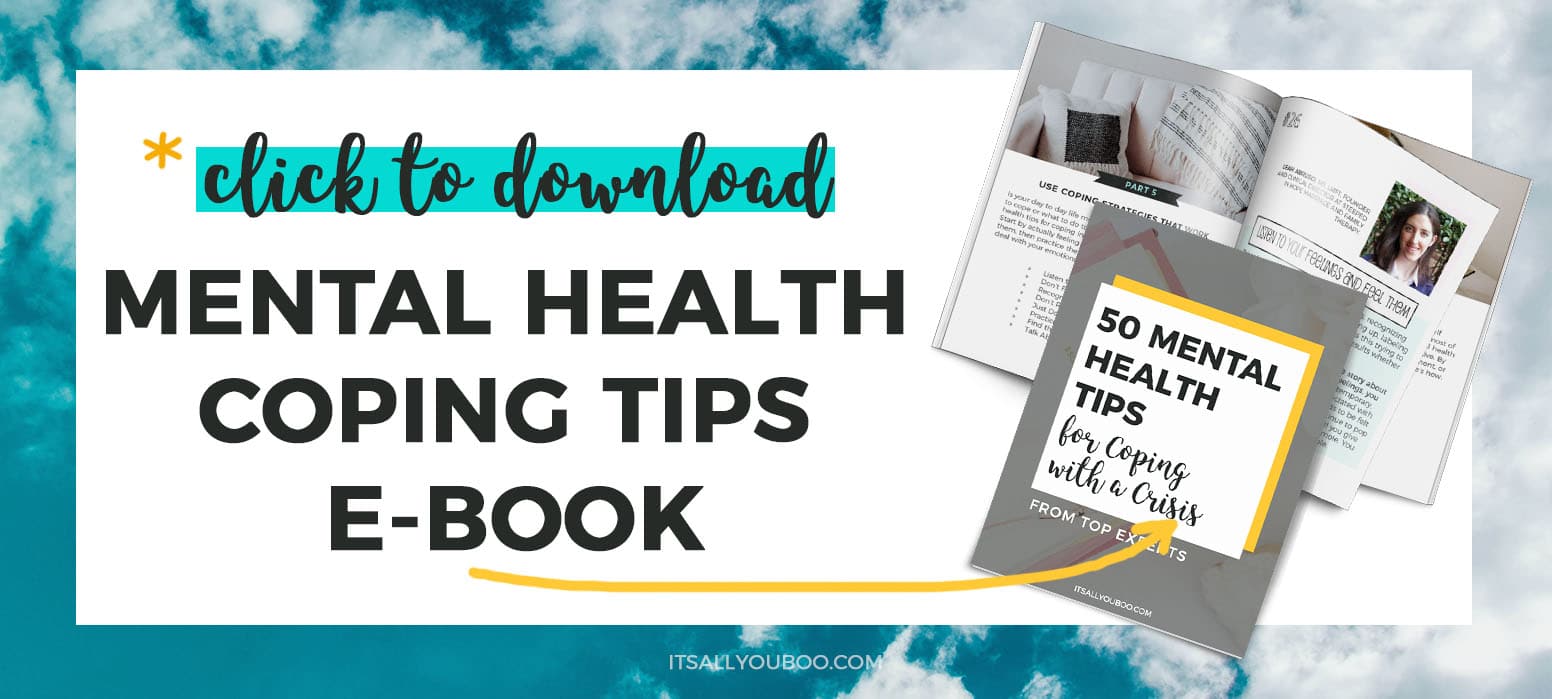
Use Coping Strategies That Work
Is your day to day life more challenging the usual? Not sure how to cope or what to do to feel better? Sometimes the best mental health tips for coping in a crisis are the ones you’ve already learned. Start by actually feeling your feelings, accepting and acknowledging them, then practice the strategies you already know. Here’s how to deal with your emotions in a crisis:
- Listen to Your Feelings and Feel Them
- Don’t Fight It, Accept What’s Going On
- Recognize, Allow, Investigate, Nurture
- Don’t Resist the Emotion
- Just Do What You Know
- Practice Your Coping Skills
- Find the Trigger, Find a Solution
- Talk About How You Are Feeling
#26. Listen to Your Feelings and Feel Them

Leah Abrusci, MS, LMFT
Founder, Steepe in Hope Marriage and Family Therapy
My number one tip for coping during this crisis is to listen to your feelings and feel them. This is done by acknowledging your feelings, recognizing the bodily sensations that they may be bringing up, labeling them, meeting them with curiosity (ex, what is this trying to tell me?), and then providing space for what results whether that be discomfort, crying, etc.
By doing this and not getting caught up in the story about your feelings, or talking yourself out of your feelings, you allow them to exist and pass. Every feeling is temporary, including the anxiety and fear that may be associated with this collective trauma. Every feeling also demands to be felt. If you continue to push them away, they will continue to pop up in relentlessly in various parts of your life until you give them the space to exist. It’s emotional whack-a-mole. You don’t want to play emotional whack-a-mole.
👉🏽 Leah Abrusci, MS, LMFT, founder and clinical director at Steeped in Hope Marriage and Family Therapy.
#27. Don’t Fight It, Accept What’s Going On

Hannah
Mental Health Blogger
Acceptance. Don’t try and fight what is going on around you, it’s happening you just have to embrace it. I start the day by saying a morning mantra. Saying something positive will help you stay focused and hopeful.
The more we try and fight this, the harder it will become for us. It’s hard, acknowledge that and then ask yourself how can I make this situation better for myself?
Try saying a morning mantra for one week and see how you feel. It could be something as simple as, “I can get through this”. Or something more specific to this crisis, “I have the strength to overcome living through this pandemic.”
👉🏽 Hannah is a mental health blogger from the North East of England. She has suffered from depression and anxiety and is now on a mission to help others with tips she learns along the way. Follow wellbeanblog to read more.
#28. Recognize, Allow, Investigate, Nurture

Kama Hagar
Meditation and Mental Health Coach
During these challenging times, those of us who consider ourselves empaths can struggle immensely with the weight of wanting to help. With social isolation enforced and strict regulations around donations, us sensitive givers of the world are feeling helpless. This feeling of helplessness often leads to self-criticism and beating ourselves up. If this sounds like you or you have the tendency to be self-critical, the best tool I can offer you is an emotional mindfulness meditation called, “RAIN,” coined by psychologist, Tara Brach. “RAIN” is an acronym that stands for, “Recognize, Allow, Investigate, Nurture.”
Here are the steps:
- Recognize – catch yourself in negative/self-critical thought
- Allow – pause and let the thought be there. Sit with it, even when you want to thrash.
- Investigate – ask yourself, “Is this thought true?”
- Nurture – tell yourself reassuring words, give yourself a hug, send yourself pure, loving energy, or whatever else makes you feel cared for. So often, we forget to nurture ourselves. Give the love you would give to anyone else going through what you’re feeling.
It takes time and practice, but this meditation has been profound for me and my clients during this time. You got this.
👉🏽 Kama Hagar is a meditation and mental health coach, blogger, reiki healer, and Hawaiian healing practitioner. Her mission is to help others practice selfless self-care to find joy, pleasure, self-love, self-acceptance, and authenticity. She works remotely from all over the world.
#29. Don’t Resist the Emotion

Tamara Pflug
Certified Life Coach, Personal Development Zone
Use your anxiety in a productive way! It’s okay to feel anxious, it’s part of the human being’s experience! The first thing to do is to accept the emotion of anxiety and not to resist it. Then, it’s a lot of energy that you can use to do something else! Organize and clean your home entirely. You don’t have to do all of it in a day! Even just a drawer per day is already great! Doing this will help your mental health AND your home to cope and to be ready for the future!
👉🏽 Tamara Pflug is a certified life coach & personal development expert, she’s the owner of Personal Development Zone. She’s passionate about helping millennials (like her!) reach their full potential and become more self-confident. Through her blog and podcast, you can learn how to bring your hidden confidence out and start living the life you want to live!
#30. Just Do What You Know

Jaimie Eckert
Individuals with OCD will most likely see a flare-up of symptoms during a crisis. Particularly for individuals in “Pure O” category of OCD, the crisis will be very tough. Pure O’s are heavy internalizers and may not have any visible compulsions, but are driven to “solve” situations and intrusive thoughts. However, in open-ended or long-term crises, there is no resolution in sight. This can lead to an uptick in the OCD spiral as we bend all our efforts to solving the unsolvable.
My best tip for surviving times of crisis if you have OCD is to do what you know. You don’t need a fancy new technique, what you need is to be utterly committed to following the strategies you’ve already learned in therapy. A crisis is like game day for mental health — it will magnify our strengths and weaknesses, but the best thing we can do is hunker down and put all our energies into doing what coach has been saying all season.
With OCD, we are particularly prone to “assurance seeking” and looking for new answers or new ways to solve our intrusive thoughts. However, the best thing we can do now is to stay the course.
👉🏽 Jaimie Eckert blogs about her journey with OCD at her website, jaimieeckert.com. She is completing her PhD in Religion and supports others who struggle with religious OCD (scrupulosity). She and her husband live abroad and are still trying to figure out where to call home.
#31. Practice Your Coping Skills

Jess, LMSW
Mental Health Counselor
My #1 tip is to practice coping skills and self care heavily. When a crisis occurs we often forget the skills we have developed over time, and of course, it is the time we should remember more than ever.
Coping skills such as adult coloring, breathing techniques, exercising, and anything else that brings you peace and clarity when done. Be sure to practice self-care such as getting the proper amount of sleep, taking a bath, talking with friends, or meditating will all rejuvenate your body and mind to be able to reevaluate the crisis from a different perspective.
Do these activities often, not just for a crisis, daily if you can. By making a habit of doing these activities you’re being as proactive as possible for your mental health by ensuring that you always feel like you have options when a crisis occurs.
👉🏽 Jess is an LMSW, mental health counselor and blogger. She writes specifically about mood disorders and mindfulness tips for people who would otherwise not receive valuable information.
#32. Find the Trigger, Find a Solution

Michelle Kuei
Certified Confidence & Leadership Coach
In order to understand which tip works for our mental health during the crisis, I feel one needs to look at what is the trigger of this “mental” health issue. Life does just suddenly go into crisis regardless of the period of time. Typically, we are in a crisis mode when something is out of balance. There are 6 factors that influence and create this balance: environmental, physical, emotional, mental, spiritual, and social.
Mental Health is a general term that has been loosely these days to describe practically anything we feel nowadays. I think it’s important to define this term first in order to address what is the underlying issue. Is this a chemical imbalance that can be addressed through pharmacotherapy? OR is this just a term for people to use when they feel stressed, overwhelmed, sad, and feeling lost of hope?
For the former, I recommend seeking professional help. Make an appointment to see a therapist/psychiatrist and address the underlying chemical imbalance. For later, one practical tip I would suggest is to identify the trigger. Is it the environment causing this feeling of stress, overwhelm, sadness? If so, what is the best thing that you can do at this moment for yourself? Perhaps it’s taking 5 minutes to walk outside to remove ourselves from this environment. Finding the trigger that led to our balance will help us narrow down in finding a solution to this imbalance in our lives. “We can’t control the weather, but we can always adjust the course of our sail to the future.”
👉🏽 Michelle Kuei is a certified confidence & leadership coach who helps negative self-talkers to discover inner strength and beauty by overcoming fear for judgments. Michelle’s speaking career began in 2018, soon after she founded her own coaching company. She is the author of the new memoir, Perfectly Normal-an immigrant’s story of making it in America. She is the secretary of the United Nations Association Pasadena Chapter in Southern California and a Clinical Pharmacist at Keck Medical Center of USC. Connect with her at Elevate Life Coaching.
#33. Talk About How You Are Feeling

Alexa Randolph
Blogger and Podcast Host
I would say that it is so important to talk about how you are feeling. It can be anything from talking to a friend, family, or even a Doctor. I have learned that the more you share the less likely it will bottle up and explode. Sometimes it might feel like you are talking a lot, but in the end, it is way healthier for you mentally and emotionally. Open up and get the help you need to take care of your mental health in a crisis.
👉🏽 Alexa is a blogger, podcast host, speaker for With Love, Alexa. She speaks on invisible illness (anything from mental health to chronic pain and chronic illness). She says her mission is to be able to help those who feel alone and like they can’t speak out.
Daily Deep Breathing and Meditation
Do you feel as if you’re taking shallow breaths or hyperventilating? What about having a hard time focusing? Taking time each day to quiet yourself and slow down with deep breaths and mediation are incredibly beneficial mental health strategies. Focusing on your breath, that slow inhale and exhale calms you down. If you’re new to breathwork or a beginner at meditation, don’t worry, here’s how:
- Ground Yourself in the Present
- Do Some Yoga and Meditation
- Use a Self-Soothing Breathing Technique
- Exhale Longer with Breath Work
- Use Alternate Nostril Breathing
- Yawn Several Times Per Hour
#34. Ground Yourself in the Present

Anna Hindell
LCSW and Yoga Teacher
My main tip to deal with a crisis is to stay in the present. People often project into the future which can bring on anxiety or even panic. If people dwell in the past, then they can get bogged down into a depressive state of mind. Or going to the future and past can result in anxious depression.
But as best as you can, using your breath, your body to ground you, and awareness of your physical body, you can ground yourself at the moment by pausing and taking few breaths. Through staying in the present, you have more of a possibility to feel your feelings, ground your body, and calm yourself down to a neutral place.
👉🏽 Anna Hindell is a LCSW in private practice in NYC and a yoga teacher.
#35. Do Some Yoga and Meditation

Jen Bradley
Blogger & Content Creator
My favorite mental health tip for coping in a crisis is to do some yoga and meditate. There are many fantastic free guided meditations and yoga flows available on YouTube that can be found in a matter of seconds. Focusing on my breathing and stretching my body have been incredibly helpful in managing stress due to this pandemic – and I never thought I was the meditation-type of person!
👉🏽 Jen Bradley is a blogger and content creator based in a little town in north Texas. A homeschooling mom of five kids, she is passionate about living a stylishly intentional life. Sign up for her free weekly motherhood tips on her website, www.jenbradleymoms.com.
#36. Use a Self-Soothing Breathing Technique

Dr. Raffaello Antonino
Counselling Psychologist
My number one tip for coping with anxiety and worry during a crisis is taking control back with a relaxed self-soothing breathing technique. This technique reduces cortisol and adrenaline in your body, which are hormones involved in anxiety build-up and maintenance.
- Sit down in a comfortable position or lay on your back;
- Gently close your eyes as you focus your attention on your breath;
- Breathe in through the nose counting to 5;
- Hold your breath counting to 3;
- Breathe out through the mouth counting to 6;
- Repeat the cycle;
- As you get in the rhythm, focus on the idea of ’slowing down’: your breath, your body, your thoughts, and emotions.
Repeat for 5-10 min and whenever your attention goes elsewhere, gently and non-judgementally bring it back to your breath. Notice your body gradually being calmer and a greater distance from your thoughts and emotions; Enjoy the distance, notice how you are not your thoughts, your emotions, and bodily sensations, but you host all of them and can choose to follow them or let them go. Letting go is how you regain control and balance. As you end your 5-10 minutes, ask yourself “what do I feel motivated to do with this renewed balance?”, “What will I do now?”.
👉🏽 Dr. Raffaello Antonino is a Counselling Psychologist practicing in London, UK with 7 years of experience working in the public and private sector. He’s worked with hundreds of clients from a variety of cultural contexts and with a multitude of anxiety, mood and relationship issues. He is a senior lecturer at the Doctorate in Counselling Psychology at London Metropolitan University, as well as also co-founder and clinical director at Therapy Central, a counselling, psychotherapy, CBT & Mindfulness practice in Central London and Online.
#37. Exhale Longer with Breath Work
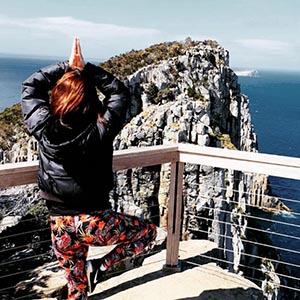
Helena
Certified Yoga Instructor
Both are powerful practices but for some, meditation can mean they’re stuck in their minds with mental chatter. Breathwork on the other hand, actively works with your breath to bypass the mind into a different state of awareness.
Science shows us that something as simple as making your exhale longer than your inhale switches on the parasympathetic state, lowering blood pressure and stress levels.
Here’s a simple technique you can try at your own pace, in your own time.
Bring your attention to your breath. Notice if it’s fast or slow, shallow or full.
- Place the tip of your tongue against your front 2 teeth and keep it there for 4 rounds of 4-7-8 breath.
- When you’re ready, inhale in and slowly count to 4.
- Gently hold the breath for a count of 7. Exhale through the mouth, keeping your tongue in place for a count of 8 to complete one round.
- Repeat 3 more times.
When you start out, if it feels like a struggle to hold for a count of 7 then speed up the round but keep to the ratio of 4-7-8.
👉🏽 Helena is a certified Yoga Instructor who specialises in covering how the mind and body can be trained for optimal performance. She is intensely curious about what can help people develop their resilience, and how to maintain physical, emotional, and mindful wellbeing through practical, daily practices. Connect with her at Seven Sundays Yoga.
#38. Use Alternate Nostril Breathing
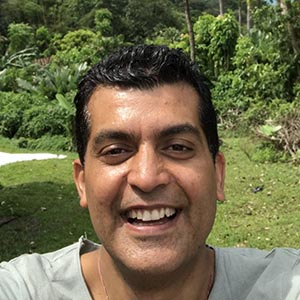
Kunwar Gadhok
Art of Living Retreat Center
The Alternate Nostril Breathing is one of Kunwar’s favorite mental health techniques. In Sanskrit, Alternate Nostril Breathing is called Nadi Shodhana Pranayama, which translates to “subtle energy clearing breathing technique”. This technique has many benefits as it helps calm and center the mind, reduce anxiety, bring a feeling of relaxation to the entire body and more.
When performed for just a few minutes, Alternate Nostril Breathing can instantly reduce stress and fatigue and is a quick and efficient practice to do when dealing with and coping with a crisis or stressful situation. When practicing this technique, it is important to not force the breath and rather keep it gentle and natural, remember to keep a breathing pattern of breathing out and breathing in, and to make sure the fingers are placed very lightly on the forehead and nose. Further information on how to do Alternate Nostril Breathing can be found here.
👉🏽 Kunwar Gadhok began meditating with his dad when he was nine years old—without knowing he was actually meditating. He loved the calm and peace after the meditations, and as he got older, he wanted to dive even deeper and find that peaceful space again. He studied various meditation teachers, practiced many different meditations, and read the ancient scriptures. For many years, Kunwar has taught and led meditation sessions and breathing practices in public settings, universities, and corporate organizations, including Microsoft, Google, Expedia, and Amazon.
#39. Yawn Several Times Per Hour

Stephanie Dalfonzo
Integrative Hypnotist
An easy way to calm stress, anxiety, and fear is to yawn several times an hour. When we yawn, whether it’s fake or involuntary, it stimulates the vagus nerve which in turn stimulates the parasympathetic or “rest, digest and relax” nervous system. By interrupting the stress pattern repeatedly, it helps to prevent it from building up to the point of overwhelm. The key is to do it on a regular basis, not just waiting until the stress levels are already through the roof.
👉🏽 Stephanie Dalfonzo is an Integrative Hypnotist, Coach, Speaker, and Author of “Goodbye Anxiety, Hello Freedom: How to Build Resilience and Overcome Anxiety.” She has spent over 20 years researching simple ways to calm stress, anxiety and fear.

Protect Your Peace and Stay Positive
Are you feeling unsettled and uneasy due to the pandemic? Find yourself restless or even freaking out? You’re not the only one. Some of the best mental health tips for coping in a crisis focus on protecting your peace. Changing some daily habits like checking the news or spending too much time on social media can help you stay calm. You can’t change what’s happening outside, but you can choose to be positive no matter what. Here’s how:
- Start the Day with Something Positive
- Go on A Low-Information Diet
- Stop Checking the News for Updates
- Peace of Mind with Holistic Practices
- Lean on Your Faith and Beliefs
#40. Start the Day with Something Positive

Samantha Moss
Editor, Romantic
Due to pandemic, a lot of news we watch from TV or browse on social media is alarming as we see increasing numbers. This can bring trauma to many of us and affect our mental health significantly. According to a survey, 45% of adults in the U.S. said that the pandemic has affected their mental health. That being said, we should also be able to manage not our physical health, but also our emotional and mental well-being.
To lessen fear and anxiety of what’s happening right now, try to oversee how you follow the media on outbreak topics. Be selective on pages and news to follow. We can be selective on what to follow to maintain balance against positive and negative news. You can also include reading positive quotes to live by. Reading something positive as you start your day may drive your mood and mind too. It is also a great way to change our outlook in life and embrace positivity.
👉🏽 Samantha Moss is the editor and content ambassador at Romantific and shares insights on topics such as dating, relationships, digital marketing, social media and more.
#41. Go on A Low-Information Diet

Krizelle
Registered Nurse
In times like this, we all want to stay informed on what’s going on with the world. Yes, following the news and going through your Facebook feed regarding the current crisis may feel necessary. But for the most part, the information we consume is negative and outside of our influence.
Simply put, too much information can lead to fear and anxiety that can negatively impact your overall mental health. So, what can you do instead?
Go on a “low-information diet” and ignore information that you directly have no control over… especially information from the wrong sources. Focus on what’s important and redirect your time to strengthen your relationships, learn a new skill, start a side hustle, and improve your physical health.
In the end, this will have a more positive impact on your life and your community.
👉🏽 Krizelle is a Registered Nurse and the founder of The Minted Latte – a blog about living intentionally to achieve financial independence. She hopes to inspire others and provide financial resources so they too can design their best life.
#42. Stop Checking the News for Updates

Kim, Miss Mental
Personal Development Blogger
Avoiding the news as much as possible helps me cope during this crisis, I noticed whenever I read the news it became a bit of an obsession and I kept checking for updates. Now that I’ve stopped reading the news I feel more relaxed and happier, I sleep better and I don’t feel as much fear. Whenever I feel the urge to watch the news I do something else instead, something that makes me happy like: watching Netflix, cuddling my baby, sitting in the garden, or yoga.
The way I see it, I can’t control what’s happening, but I can control my actions, I can control how I feel by making sure I don’t get dragged into a toxic spiral of checking the news. It can’t stop what’s happening if I read the news, even though it feels like a false sense of security, things will happen anyway.
👉🏽 Kim is a personal development blogger, psychology student & expert by experience living in the Netherlands. She’s determined to decrease the stigma associated with mental health and she’s helping people live their best life on her blog. Kim shares 50 Positive affirmations with helpful free affirmation cards.
#43. Peace of Mind with Holistic Practices

Chris Fagan
CEO, 1000 Islands Wellness and Treatment Centre
During these difficult times, there is a part of just about everyone who feels a bit lonely, so it’s critical that we continue to reach out and support one another. If you know someone who battles mental health, give them a call and speak to them on the phone. At the moment, there is so much negativity being shared on the news and social media, so it’s best to distract ourselves with other things.
However, that is easier said than done. I recommend working on holistic practices, maintaining a daily self-care routine, virtual counseling/therapy, and physical exercise to help cope during this pandemic. I also recommend meditation. Many believe that meditation is difficult, but nothing is further from the truth. The simple act of sitting in a quiet room and focusing on a candle flame or concentrating on your breath is all it takes. This can pay tremendous dividends for peace of mind.
👉🏽 Chris Fagan is the CEO of 1000 Islands Wellness and Treatment Centre is a private treatment centre with full medical detox and premium services to help people recover from addiction as well as address and identify underlying issues driving the substance dependency. We are a non-12-step based centre and utilize an abundance of treatment modalities that are evidence-based and clinical. We provide 24-hour medical support, individualized attention, and provide a program that is custom-tailored to the individual’s needs.
#44. Lean on Your Faith and Beliefs

Deeksha
Blogger
In my opinion, having faith in God is my one tip for coping in a crisis when it comes to maintaining your mental health. If you’re religious, it’s very important that you read religious books daily as it can help you feel positive and look at things in a different way.
Having faith in God makes you feel you are not alone and that there is someone always looking after you from above. It helps in surviving the tough times of life without slipping in depression and anxiety.
👉🏽 Deeksha is a mommy of a little girl, a school teacher by profession, and a blogger by passion. She loves reading and writing real-life motivational stories of women who never ever gave up in their lives!

Make the Most of the Situation
Does the pandemic feel like the worst thing ever? Find yourself focusing on how horrible things are? You need to make the most of the situation, despite what’s going on. This final set of mental health tips for coping with a crisis focus on changing your perspective. By focusing on what’s important, making the most of this moment, or even planning ahead, you’re able to shift your mindset. Here’s how:
- Focus on Post-traumatic Growth
- Indulge in Your Interests
- Plan Ahead with a List
- Rediscover Your Values
- Avoid Comparing Yourself to Others
- Focus on What’s Important
#45. Focus on Post-traumatic Growth

Dr. John Schinnerer
Success and Happiness Coach
Focus on Post-traumatic growth rather than Post-traumatic Stress. There is a relatively new concept in research…post-traumatic growth. Post-traumatic growth (or PTG) refers to the positive life changes that occur for many people following a traumatic life event. There can still be the residue of PTSD – stress, images, anxiety, flashbacks, etc. And just like PTSD, PTG requires severe crisis rather than mere stress.
Right now, we are all in a traumatic situation, whether or not we realize it. We are currently grieving our old way of life, which is no more. However, those people who focus on the growth they can experience as a result of difficulties have been shown to be more resilient in the face of adversity. PTG is accompanied by real-life changes in behavior and perception and requires a shattering of basic beliefs regarding one’s life and the world and subsequent rebuilding of the framework, the lens through which you see the world. The Essential Paradox that emerges is “Despite the struggle, I have gained something of value. I am more vulnerable, and simultaneously psychologically stronger.”
👉🏽 Dr. John Schinnerer coaches men to greater success and happiness. Dr. John graduated from U.C. Berkeley with a Ph.D. in psychology. He was an expert consultant for Pixar’s Inside Out. Dr. John recently received the award for Best Executive Coach for 2020 and Best Social Content in 2019. His areas of expertise range from high performance, to positive psychology, to anger management. Dr. John hosts a top 10 (in self-help) podcast to help men find success and happiness, The Evolved Caveman. Visit TheEvolvedCaveman.com to learn more about the podcast and Dr. John.
#46. Indulge in Your Interests

Karen Chen
Productivity and Lifestyle Blogger
Ever wanted to start writing a story but have never had the time or energy? To start your own website? To start creating content?
See this opportunity as a gift of extra time to use for your interests, don’t waste it. You don’t know when you can get an abundance of time like this again. Start a passion project – there are resources everywhere to be found! There are tons of online classes, web seminars, even an abundance of tutorials on YouTube.
Personally, I’ve started coding together a Greek mythology-based story, filming weekly content for my YouTube channel, and indulging in marketing to expand my creative platform!
👉🏽 Karen Chen is a productivity and lifestyle blogger from rainy British Columbia. She helps students find success in their academics, self love, and creating a productive lifestyle, and hopes to become an author one day.
#47. Plan Ahead with a List

Francesca Littler
Beauty and Wellness Blogger
Make a list of things you want to do once the lockdown has ended. They could be small things like visiting family and friends or having a picnic in the park. If you’re feeling more adventurous then you could include exciting places you want to go on holiday. Whatever it is that you include in your list, it will give you something to look forward to when you are struggling to stay positive.
You could also collaborate with your loved ones and make a list of things you want to do together. It’ll give you something to talk about so you feel less isolated and you can have a laugh listening to each other’s wild ideas! Planning ahead is a great reminder that this situation won’t last forever. It will end and we will once again be able to do the things that we want to do. Get planning so that you can make the most of your freedom when this is all over and cheer yourself up in the meantime.
👉🏽Francesca Littler is a Biology student from UK. She runs a Beauty and Wellbeing blog with a focus on spreading positivity and encouraging people to build their self-confidence.
#48. Rediscover Your Values

Dr. Clinton Moore
Clinical Psychologist
To boost your mental health during the pandemic, take the opportunity to check in with your values. During normal life, you can lose sight of the things that really matter as you chase goals often created by others. While the lockdown restricts some of our old activities, it also offers the time to start moving towards purpose rather than doing things on autopilot.
Use this time to invest in something that can provide you with a sense of growth. Perhaps now could be the time to start a new hobby, or just reconnect with family more. The key is to take a few minutes to sit down and write a list of your top 5 values and then see if you can move towards them each day. Not only will this have great long term practical outcomes, but it might also help you create a sense of meaning during these uncertain times.
👉🏽 Dr Clinton Moore is a Clinical Psychologist and the founder of Cadence Psychology – a clinical psychology practice operating in North Sydney, Australia with a focus on change.
#49. Avoid Comparing Yourself to Others

Brittany Ferri, MS, OTR/L, CCTP
Occupational Therapist
My most important tip for maintaining mental health during times of crisis is to avoid comparing yourself to others. Oftentimes, this can increase feelings of anxiety, guilt, competitiveness, and frustration that ultimately will lower your self-esteem and worsen your emotional state.
Especially during our current time of crisis and corresponding isolation/social distancing, it can be easy to use social media and other similar outlets to check up on other people, since this is our only source of connection currently. However, this can make us feel badly about how we are spending our time in isolation, though this may be exactly what we need. For example, if we see someone posting on Facebook about how they rearranged all the furniture in their entire house and planted a full garden in their time off, we may hold ourselves to the same standard.
Yet, some people’s best way of coping is by engaging in productivity-based tasks, while your way of coping may be something entirely different (like taking time to relax, journal, catch up on sleep, or read). Far too often, we are harsher on ourselves than we need to be, which only serves to worsen our current mental and emotional health. This ideal can also be applied to any other crisis since our current state of global health mimics a state of loss, grief, and intense fear that is present among other major life events such as death, divorce, and transitions between jobs.
👉🏽 Brittany Ferri, MS, OTR/L, CCTP is an occupational therapist, certified trauma practitioner, and founder of Simplicity of Health, LLC. She specializes in mental health, integrative care approaches, and health education. For more information about occupational therapy and the services, Brittany offers, visit www.simplicityofhealth.com.
#50. Focus on What’s Important

Brenda
Ria Health
My number one mental health tip for coping in a crisis would be to focus on what is important. When you are going through a crisis and then have to deal with the aftermath of it all; you need to establish and focus on your resources. Just getting through the day can be a major accomplishment during such times. So, reducing your responsibilities can be a way to manage and can sometimes be a key factor.
A person can use this time to prioritize their life. Put unnecessary commitments on hold and focus on what really needs to get done, or the things you have control over. Leave the rest. This will allow you to conserve your physical and emotional energy and ensure you are practicing an abundance of self-care. Whether you are dealing with grief, stress, anxiety, or loneliness you have to utilize support systems. This is not the time to isolate yourself from family, friends or the world. If you do not have a healthy support system; there are many online chat rooms or groups with people that have the same or similar issues that you are going through that you can join. This will allow you to have a healthy outlet to express your thoughts/feelings without any judgments while maintaining your mental health and well being.
👉🏽 Brenda is committed to fighting addiction from a holistic and harm reduction standpoint. She believes that by planting a seed of hope, it can be the deciding factor on the road to a successful recovery and mental wellbeing. Visit Ria Health.
Best Mental Health Tips for Coping in a Crisis
Wasn’t that incredible? There are so many good mental health coping skills and strategies you can use every day.
Although this pandemic isn’t ideal, set your mind to positive and make the most of your circumstances. No matter what you’re better able to deal with whatever challenges come your way when you are calm.
Take these tips with you, and refer back to them as you need them.
Save a Copy, Get your FREE eBook
Please remember to be sure to seek professional help if you need it.
Don’t feel pressured to feel or act a certain way during this crisis. Do what you have to do for you. Use the coping skills and strategies that work best for you and your family.
Take your time, take care of yourself and those around you. Good mental health is a lifelong pursuit that you can start today.
Do you need coping skills and strategies that work? Click here for 50 mental health tips for coping with a crisis from top experts. #MentalHealth #MentalHealthMatters #StayAtHome #MentalHealthAwareness

Which mental health tips for coping in a crisis do you use?
Last Updated on June 3, 2025






